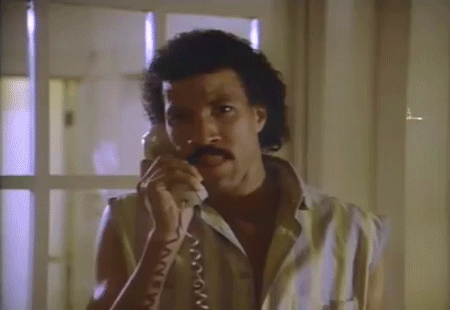Pettiness, Moodiness & Other "Friendship Irritants" To Work Through

Man. This certainly brings new meaning to the "seven-year" itch. According to scientific research, guess how long most friendships, on average, last? Yep. Seven years. Why? Well, the article that I read said it's due to a few different factors—never having a formal ceremony to profess your platonic commitment (that might sound weird but I get it; it speaks to intention), lifestyle changes that can cause people to drift apart and other relationships coming along that eventually take a higher priority (like marriage, kids, etc.).
All of that makes sense, but when I think of why a lot of my friendships now have the word "former" in front of them, it's usually because 1) they didn't need to be friends of mine in the first place; 2) my and/or their friendship needs shifted and/or 3) I didn't know the difference between what I call "friendship irritants" and straight-up deal-breakers were at the time.
What I mean by that last one is this. It is true that, sometimes there are people who come into our lives, who get closer than they should, and receive more benefits than they ever deserve. Once we come to the realization that they are not good for us, it's time to release them and move on.
But sometimes, if a lot of us were honest with ourselves, some friendships tank simply because we don't exercise enough tolerance, patience and forgiveness. Because, let's be real—even the best friendships consist of two imperfect people who are gonna do all kinds of imperfect things; including to each other sometimes.
That's why it really is important to know the difference between a friend who is toxic and a friend who sometimes simply irritates you. If one (or some) of your friends is guilty of the following friend irritants, maybe these tips will help you to work through them, so that they don't have to be thrown into your every two-, five- or seven-year friendship rotation. So that they can last much longer than that.
Pettiness

Petty is one of those words that is used so much that I think it's important to go over what it actually means, just so we all can be sure if we truly do have a very petty friend or not. When someone is being petty, they are caught up in things that are "of little or no importance or consequence" or they are operating from a place of "having or showing narrow ideas, interests, etc." Whew. I don't know about you, but the first thing that comes to my mind, with both of these, are all of the petty exchanges that transpire across social media.
Anyway, if you were to apply these definitions to interactions in friendships, someone is truly petty if:
- They screenshot conversations and share them with others
- They are passive aggressive (aka sub-tweet a lot) on social media
- They like to be condescending or patronizing
- They continually dish what they can't take
- They hold grudges and seek revenge about things that aren't that big of a deal
Whew again. For the record, all of these might seem the opposite of "little or no importance or consequence" but the reason why I think they are spot-on with that definition of petty is because petty folk are kings and queens of making mountains out of molehills; something out of nothing. In other words, they cause drama out of stuff that, at the end of the day, isn't all that important. And, if they handled things differently, there would be far less fall out (consequences).
Anyway, on the surface, a petty individual might seem like a toxic person to be around. But I'd say that it all depends on how often a friend of yours displays this kind of behavior. If it's only when they're really upset or super stressed out, cut them a break. But if it's a pattern, I suggest bringing their pettiness to their attention, along with some clear examples (because petty people also typically have a bad memory and are never wrong). If they value the relationship, they'll tame their pettiness, even if it's just when it's around (or directly affects) you. If they don't, then it might be time to realign your boundaries. Because something else that people who are consistently petty do is drain the energy of those around them. If not immediately, eventually.
Moodiness

I don't know about you, but I've always been the kind of person who would prefer for someone to be pure evil all of the time than an angel on one day and Satan's cousin the next. Why? Because at least when you're always mean as a bat, I can come up with a way to deal with you. But if you're unpredictable, it's literally like being on a non-stop emotional roller coaster ride. One that gets sickening, after a while.
Although moody friends can be totally annoying in about every way imaginable, the reason why I don't recommend automatically cutting them off is, oftentimes, their mood swings are connected to underlying issues—hormonal imbalances, stress, problems that they're internalizing, sleeplessness, PTSD or Fantasia's version of "PTSD" (Post Traumatic SEX Disorder).
One of the traits of being a good friend is sympathy and, where it applies, empathy as well. If you've got a friend who seems to be any and everything but emotionally stable, set some time aside to treat them to dinner or to go to their house, look them in the face and ask what's up. Sometimes, just by you putting the (extra) effort in to show that you care, it can be the first step to getting your friend to a place of balance.
“One Upping”

Know-it-all friends. Oh, you know the type. Argumentative. Patronizing. Condescending. Prideful. Always got a series of hyperlinks to send you to back up their theories on something. Then, if you do prove them wrong, they find some way to minimize your hypothesis. They give advice but can't take it. They're always talking but can't ever seem to listen. They can easily point out your problems but are somehow never fully capable of resolving their own. These are the type of people who always seem to be in a weird form of competition with those around them. You just started a business but, instead of congratulating you, they spend 15 minutes talking about their own goals and plans. Your man just proposed and when you want to tell them about it, suddenly they decide to discuss the trip they are about to go on with some friends. Everything is about one-upping, whether they are self-aware enough to realize it or not.
Still, you don't want to toss the friendship away because they are mad loyal, always have your back and can be a lot of fun, more times than not. In this case, what do you do? Not too long ago, I penned a piece on here entitled "According To Aristotle, We Need 'Utility', 'Pleasure' & 'Good' Friends". Friends who think they know everything oftentimes can't handle an in-depth conversation about humility (which is something that they definitely need). So, maybe scale back a bit on some of the things you typically discuss with them. Also, take some time out to figure out what kind of friend they are. Maybe they're not meant to know a ton about your life. Maybe they are the friends you visit a winery with or pray with. Not every friend has to check every box. Accept that and life—and your friendships—will be so much easier for—and on—you.
Unsolicited Advice

An author by the name of Shannon A. Thompson once said something that I totally agree with—"Sometimes an outside perspective is the clearer perspective." If you're truly on the quest for wisdom, maturity and evolution, you will be open to receiving advice; especially from people whose consistency in your life has proven that they really do care about you.
But as someone who has a strong personality and gets paid to give advice, I have learned that when I'm having a conversation with a friend, they say something that seems crazy, counterproductive or I just don't agree with, before forcing my opinions and insights, I'll start off by saying, "Do you need me to listen or did you want me to say something?" If they go with Door B, sometimes I'll follow that up with, "OK. Do you want Shellie at 100 percent or watered down a bit?" It might sound funny, but you'd be amazed how much tension those two simple questions are able to alleviate.
If the thing that super duper gets on your nerves about a friend of yours is they have appointed themselves to be your personal sensei, it's OK to let them know that you are not always looking for a counselor, therapist or teacher; that when you need their advice, you will totally let them know—by asking for it.
Only ego maniacs will take offense with this kind of boundary. And, if that is the kind of friend you're dealing with, trust me, you've got a lot more challenges going on than the advice that they're constantly trying to force on you on your hands. Just sayin'.
Social Media TMI (or Passive Aggressiveness)

While recently watching an episode of Righteous and Rachet (shout out the KevOnStage and DoBoy) on YouTube, they were interviewing a fellow comedian by the name of Akaash Singh. As they were chatting it up about how to pronounce words like "Pakistan" and "namaste" and what real Indian cuisine consists of (it really was an enlightening conversation), Kevin mentioned that he's got some friends who get in their feelings (my words, not his) because he, as he puts it at the 12:50 mark, doesn't like "the social media version" of them.
When you read that, didn't you have a friend who immediately came to mind? Maybe they are constantly telling ALL of their business, they seem to post 10-15 times a day, they are selfie addicts, they sub-tweet their man every chance that they get, or they always have something to complain or throw a pity party about.
If other than this, they are a stellar friend, I say do what Kev does. Although I'm not on social media, back when I was, I always saw my profile page to be MY page. So, when people came over to my side of cyberspace to try and "police" me, that really got on my nerves. Post and talk about what you want to on your page and I'll do the same thing on mine, thank you very much. Here's the thing about that—this is a rule that I shouldn't only enforce but respect. Meaning, just like I should be given the space to do and say whatever, so should the folks I interact with on social media sites.
That said, just because you and someone are friends in real life, that doesn't automatically mean that you have to be connected on social media.
I actually know some married people who don't follow each other; not because there's something to hide but since they also share so much of their lives together, they don't really want to see each other show up in one another's feeds.
So yeah, if the biggest issue you have in your friendship is that they get under your skin whenever they are online, "hide" their profile or unfollow them. If you think they are going to feel some type of way about it, give them the heads up. If y'all are true friends, it really shouldn't be all that deep. It really shouldn't. After all, you're not rejecting them. You're simply letting them be without you getting triggered or irritated in the process.
Inconsistent Communication

Here's a "friendship irritant" that is kind of subjective. I say that because, while you may think that friends should talk once a week, you might have a friend who believes that you damn near should be on-call 24 hours a day. In my world, I have friends who I talk to, pretty much on a daily basis. It's not because we're on our phones, though. It's because I write for a living and they are online doing branding stuff, promoting a gig or something along those lines. So yeah, it's nothing for us to shoot a few emails back in forth. Then I've got friends who are not the biggest fans of being online or talking on the phone. For us to stay connected, we have to literally plan out times to connect and catch up.
Before I figured out that that was how some of my friends are, I would get irritated when I felt like I was doing most of the calling or putting in the most proactive energy to make the relationship work. But once I stopped pouting about it and brought it up to them, the effort has had more of a balance to it.
No one person should do all of the work to make a friendship last. If you're currently irritated because you feel like that person is you, before you assume that you are being neglected or taken for granted, talk that over with your friend. If they are a good friend, I can promise you that 1) you come to their mind more than you think and 2) now that they are aware that your communication needs are different, they will figure out how both of you can be happy. Again, if they are a good friend, they will do this.
Incompatible Expectations

Me? I'm the one who likes my friends to keep their word. My friends, though? One of them hates—and I mean hates—for you to not show up somewhere on time. Another one feels some type of way if I don't set aside quality time for her. One of my male friends just wants his birthday to be remembered and commemorated, on time. Another friend is big on words of affirmation.
The reason why I know all of this is because I've made the time to study my friends and ask them what they expect from our relationship. Personally, out of all of the things that I shared, I think this point might be the cause of the most irritation in a lot of friendships. The root of this one is either one friend not knowing what the other expects or assuming that a friend should have the same expectations that they do.
I'll give you an example of how this can cause things to go awry. I've got a friend who is pretty sketchy when it comes to her phone. What I mean by that is sometimes it's on, sometimes it's off. Sometimes she brings it to work, sometimes she doesn't. Meanwhile, she's got a friend who is, let's say "hyper-vigilant", when it comes to communication. Because my friend is very "blah" about her cell, it causes her friend to feel as if she is being flippant or dismissive. Then, by the time her friend is able to track my friend down, she comes off as needy or high-maintenance, which totally puts my friend off. Her friend is a good friend, though, so she doesn't want to cut her off, even though this has been a lasting issue that gets on her very last nerve.
From what she's shared with me about the quality of their relationship, she shouldn't let her friend go. But there does need to be an open dialogue about what's going on. Then both of them need to come to a point and place of compromise. That's what friendship is all about. Not necessary getting all of what you expect but finding a way to get what you need while providing what your friend needs too; even if they are not one in the same.
It takes real maturity to want to work through "friend irritants" but if someone means a lot to you, it's worth it. What they bring to your life is of far more value then the nerve that they get on. When it comes to friendship preservation, it's words to live by, y'all. It really and truly is.
Want more stories like this? Sign up for our newsletter here and check out the related reads below:
The 5 Must-Have Friends Everyone Needs
10 Signs You've Got A Close (TOXIC) Friend
Allow These Things To Happen Before Calling Someone "Friend"
10 Things You Should Absolutely Expect From Your Friendships
Feature image by Giphy
- 10 Signs You've Got A Close (TOXIC) Friend - xoNecole ›
- How To Heal From A Broken Friendship - xoNecole ›
- The Truth About Maintaining Friendships As An Adult - xoNecole ›
- How To Maintain Your Mental Health & Sustain Healthy Friendships At The Same Time - xoNecole: Women's Interest, Love, Wellness, Beauty ›
- Coping With An Overly Argumentative Partner - xoNecole: Women's Interest, Love, Wellness, Beauty ›
- 5 Rules For Having Friends With Benefits Relationship - xoNecole: Women's Interest, Love, Wellness, Beauty ›
- Frenemies & toxic friendships: teenagers | Raising Children Network ›
- Why Work Friendships Go Awry, and How to Prevent It ›
- Friendship and mental health| Mental Health Foundation ›
- Why work friendships are critical for long-term happiness ›
- What You Haven't Considered About The Dark Side Of Friendships ... ›
- 5 Ground Rules for Workplace Friendships ›
- The Care and Maintenance of Friendship ›
- Friendship difficulties - Psych4Schools ›
- How to Solve Common Friendship Problems | The Healthy ›
Exclusive: Viral It Girl Kayla Nicole Is Reclaiming The Mic—And The Narrative
It’s nice to have a podcast when you’re constantly trending online. One week after setting timelines ablaze on Halloween, Kayla Nicole released an episode of her Dear Media pop culture podcast, The Pre-Game, where she took listeners behind the scenes of her viral costume.
The 34-year-old had been torn between dressing up as Beyoncé or Toni Braxton, she says in the episode. She couldn’t decide which version of Bey she’d be, though. Two days before the holiday, she locked in her choice, filming a short recreation of Braxton’s “He Wasn’t Man Enough for Me” music video that has since garnered nearly 6.5M views on TikTok.
Kayla Nicole says she wore a dress that was once worn by Braxton herself for the Halloween costume. “It’s not a secret Toni is more on the petite side. I’m obsessed with all 5’2” of her,” she tells xoNecole via email. “But I’m 5’10'' and not missing any meals, honey, so to my surprise, when I got the dress and it actually fit, I knew it was destiny.”
The episode was the perfect way for the multihyphenate to take control of her own narrative. By addressing the viral moment on her own platform, she was able to stir the conversation and keep the focus on her adoration for Braxton, an artist she says she grew up listening to and who still makes her most-played playlist every year. Elsewhere, she likely would’ve received questions about whether or not the costume was a subliminal aimed at her ex-boyfriend and his pop star fiancée. “I think that people will try to project their own narratives, right?” she said, hinting at this in the episode. “But, for me personally – I think it’s very important to say this in this moment – I’m not in the business of tearing other women down. I’m in the business of celebrating them.”
Kayla Nicole is among xoNecole’s It Girl 100 Class of 2025, powered by SheaMoisture, recognized in the Viral Voices category for her work in media and the trends she sets on our timelines, all while prioritizing her own mental and physical health. As she puts it: “Yes, I’m curating conversations on my podcast The Pre-Game, and cultivating community with my wellness brand Tribe Therepē.”
Despite being the frequent topic of conversation online, Kayla Nicole says she’s learning to take advantage of her growing social media platform without becoming consumed by it. “I refuse to let the internet consume me. It’s supposed to be a resource and tool for connection, so if it becomes anything beyond that I will log out,” she says.
On The Pre-Game, which launched earlier this year, she has positioned herself as listeners “homegirl.” “There’s definitely a delicate dance between being genuine and oversharing, and I’ve had to learn that the hard way. Now I share from a place of reflection, not reaction,” she says. “If it can help someone feel seen or less alone, I’ll talk about it within reason. But I’ve certainly learned to protect parts of my life that I cherish most. I share what serves connection but doesn’t cost me peace.
"I refuse to let the internet consume me. It’s supposed to be a resource and tool for connection, so if it becomes anything beyond that I will log out."

Credit: Malcolm Roberson
Throughout each episode, she sips a cocktail and addresses trending topics (even when they involve herself). It’s a platform the Pepperdine University alumnus has been preparing to have since she graduated with a degree in broadcast journalism, with a concentration in political science.
“I just knew I was going to end up on a local news network at the head anchor table, breaking high speed chases, and tossing it to the weather girl,” she says. Instead, she ended up working as an assistant at TMZ before covering sports as a freelance reporter. (She’s said she didn’t work for ESPN, despite previous reports saying otherwise.) The Pre-Game combines her love for pop culture and sports in a way that once felt inaccessible to her in traditional media.
She’s not just a podcaster, though. When she’s not behind the mic, taking acting classes or making her New York Fashion Week debut, Kayla Nicole is also busy elevating her wellness brand Tribe Therepē, where she shares her workouts and the workout equipment that helps her look chic while staying fit. She says the brand will add apparel to its line up in early 2026.
“Tribe Therepē has evolved into exactly what I have always envisioned. A community of women who care about being fit not just for the aesthetic, but for their mental and emotional well-being too. It’s grounded. It’s feminine. It’s strong,” she says. “And honestly, it's a reflection of where I am in my life right now. I feel so damn good - mentally, emotionally, and physically. And I am grateful to be in a space where I can pour that love and light back into the community that continues to pour into me.”
Tap into the full It Girl 100 Class of 2025 and meet all the women changing game this year and beyond. See the full list here.
Featured image by Malcolm Roberson
This Is How To Keep 'Holiday Season Stress' From Infecting Your Relationship
Hmph. Maybe it’s just me, but it seems like there is something really weird happening in the fall season air (because winter doesn’t officially begin until December 21) that cuddle season is in full swing while break-up season is as well. In fact, did you know that break-ups are so popular during the holiday season that December 11 is deemed Break-Up Day?
The reasons why relationships shift around this time vary; however, I did both roll my eyes and chuckle when I read that a very popular one is because it’s an easy way to get out of getting one’s significant other a Christmas present. SMDH.
Anyway, I personally think that the less shallow folks out here may contemplate calling things “quits” or they at least distance themselves a bit from their partner (and what I’m referring to is serious relationships) due to all of the stress and strain that oftentimes comes with the holidays whether it be financial, familial, due to their tight schedules or something else.
Listen, I would hate for you and your man to miss the fun and happiness of experiencing this time of year, all because you are so overwhelmed or irritated that you can’t really enjoy it. That’s why I have a few practical tips for how to avoid allowing the typical holiday season stress from INFECTING your relationship.
Manage Your Expectations
 Giphy
GiphyUnmanaged expectations. If there is a main reason why the holiday season tends to be so stress-filled for so many people, I’d bet good money that this is the cause. And when you’re in a long-term relationship, expectations can manifest themselves in all sorts of cryptic and/or unexpected ways. You might have relatives who assume that you are going to be with them for Thanksgiving or Christmas when you have other plans in mind. You might be thinking that you are going to spend one amount for presents while your man is thinking something totally different. When it comes to scheduling, your signals may be crossed.
And you know what? To all of these scenarios, this is where clear and consistent communication come in. Don’t assume anything. Don’t dictate anything either. From now until New Year’s, mutually decide to check in once a week, just to make sure that you are both on the same page as it relates to the holidays and what you both are thinking will come along with it. The less blindsided you both feel, the less stressed out you will be. Trust me on this.
Set (and Keep) a Budget
 Giphy
GiphyOkay, so I read that last year, 36 percent of Americans incurred some type of holiday-related debt. Hmph. Last year, there was still some sense of normalcy in this country, chile, so I can only imagine what finances are gonna look like over the next several weeks. That said, since I don’t know a lot of people who don’t find being broke stressful, make sure that you and your bae set a budget and then stick to it this year — no ifs, ands or buts.
Because really, y’all — it doesn’t make sense to deplete savings and/or max out credit cards for a few days of giggles only to be damn near losing your mind because you don’t know how to make ends meet come Dr. Martin Luther King, Jr. Day.
And by the way, this tip doesn’t just speak to things like food and gifts; I also mean travel. If it doesn’t make a ton of sense (or cents) to be all over the place this year — DON’T BE.
Keep Matthew 5:37 at the Forefront
 Giphy
GiphyIf off the top of your head, you don’t know what Matthew 5:37 says, no worries, here ya go: “But let your ‘Yes’ be ‘Yes,’ and your ‘No,’ ‘No.’ For whatever is more than these is from the evil one.” That verse right there? Oh, it’s a boundaries lifesaver! I say that because do you see “maybe” or “I’ll think about it” in there? Nope. LOL. It says that you should tell people “yes” or “no” and leave it at that — and that complements Anne Lamott’s quote, “’No’ is a complete sentence” impeccably well. Yeah, you’ve got to remember that anything beyond a yes or no to a request is privileged information; you don’t owe anyone details or an explanation.
Besides, if you are really honest with yourself, when someone asks you something and you give a “Umm, let me think about it” kind of reply, more times than not, you already know what your answer is going to be — so why not let you both off of the hook? Give your response. Commit to that. And let everyone (including yourself) get on with their lives and schedules.
I promise you that when it comes to those holiday parties, you are pissing more folks off by not RSVP’ing or doing so and not showing up than just saying, “Thank you but not this year” off the rip.
Remember That Your Personal Space Is Privilege Not a Right
 Giphy
GiphyA friend of mine recently bought a new house and invited me over to come see it. He’s a single man with no children, so as I was taking in all of the space that he had, especially as I walked through his finished basement, I joked about relatives coming to live with him. “Hell no” and “absolutely not” were pretty much his immediate responses as he went on to say that some folks even had the nerve to be offended when he told them that he had no intentions on taking DNA in.
Ain’t it wild how people think that your stuff is their right? And yes, that brings me to my next point. Your home is your sanctuary space. If you want to host folks this year — cool. If not, ALSO COOL. Please don’t let folks (family included) guilt you into how they want you to act or even into what they would do if the shoe was on the other foot. You are not them — and as one of my favorite quotes states, “If two people were exactly alike, one of them would be unnecessary.” (A man by the name Larry Dixon said that.)
Hell, my friends? They know that I am good for sending them random things that they need or even want all throughout the year. Coming over to hang out at my pace, though. Uh-uh. Chalk it up to being a card-carrying member of the ambivert club yet I like keeping my living space personal — and I sleep like a baby, each and every night, for feeling that way.
Always remember that your space, your time, your resources, your energy and shoot, yourself period (including your relationship), are all things that are your own. You get to choose how, when and why you want to share them. The holiday season is certainly no exception.
Cultivate Some “You Two Only” Traditions
 Giphy
GiphyIt’s not uncommon for some couples to hit me up after the holiday season to “detox.” Sometimes it’s due to the financial drama (and sometimes trauma) that they experienced. Sometimes it’s because they allowed their relatives (especially in-laws) to get more into their personal business than they should’ve. More than anything, though, it tends to be because they didn’t get enough quality time together and so ended up feeling “disconnected.”
Please don’t let that happen. Listen, I’m not even a holidays kind of woman and yet, I will absolutely sit myself down with some hot chocolate and chocolate chip cookies to enjoy a Hallmark holiday film or two. Aside from the fact that most of them are lighthearted and sweet, I also like that they usually focus on couples loving on each other amidst all of the holiday beauty and ambiance — which is something that all couples should set aside some time to do.
Maybe it’s a vacation. Maybe it’s a staycation. Or maybe it’s my personal favorite, A SEXCATION. Whether it’s for a few days, the weekend or even overnight — don’t you let the holidays go by without setting aside time for you and your man to celebrate one another. Don’t you dare (check out “Are You Ready To Have Some Very Merry 'Christmas Sex'?”).
GET. SOME. REST.
 Giphy
GiphyI once read that 8 out of 10 people get stressed out over the holidays and 3 out of 10 lose sleep during to it — and when you’re stress-filled and sleep-deprived, that can absolutely lead to hypersensitivity, making mountains out of molehills and even not being in the mood for sex.
Your relationship can’t afford to go through any of this, so definitely make sure to prioritize rest. I don’t care how unrealistic it might seem during this time, sleep should never be seen as a luxury; it will always and forever be a great necessity.
That said, try to get no less than six hours of shut-eye in (check out “6 Fascinating Ways Sex And Sleep Definitely Go Hand In Hand”) and even ask your bae to take a nap with you sometimes (check out “Wanna Have Some Next-Level Sex? Take A Nap, Sis.”). Not only will sleep help to restore your mind, body and spirit but, when it’s with your partner, it’s an act of intimacy that can make you both feel super connected, even in the midst of what might feel like chaos.
___
Holiday season stress is real. Still, never give it the permission or power to throw your relationship off. Put you and your man first and let the holidays be what they are gonna be, chile.
Let’s make things inbox official! Sign up for the xoNecole newsletter for love, wellness, career, and exclusive content delivered straight to your inbox.
Featured image by Shutterstock









